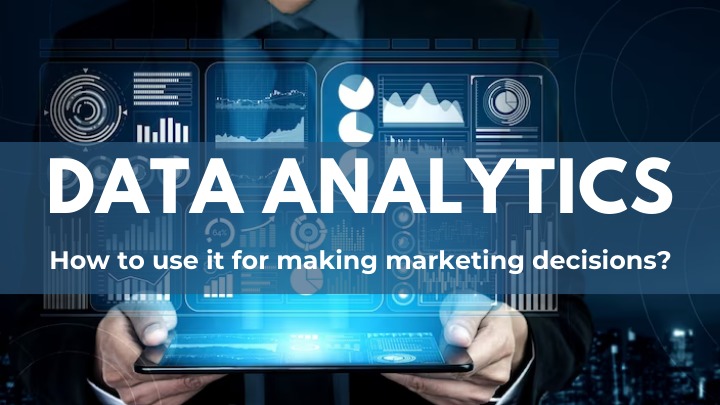
In today’s digital era, the role of data analytics in marketing is growing exponentially. Understanding the potential of utilizing data to make informed marketing decisions is fundamental to success. This article will explore how businesses employ data analytics to steer their marketing efforts effectively. Keep reading to learn more about this transformative approach to marketing.
What is data analytics in marketing?
Data analytics is the science of examining raw data with the purpose of concluding that information. It’s used in many industries to allow businesses and organizations to make better decisions and verify and disprove existing theories or models. The process of data analysis includes cleaning, inspecting, transforming, and modeling data to highlight useful information for decision-making.
The power of data analytics has revolutionized the world of marketing. It’s no longer about merely reaching a large audience but about reaching the right audience at the right time. Data analytics provide marketers with necessary insights into who their audience is, what they want, and how they can be influenced. This kind of targeted, data-driven marketing is what sets successful businesses apart in the crowded market space of today.
Benefits of data analytics
Making use of data analytics in marketing is following the evidence, taking the guesswork out of decision-making. Data science allows for precise, efficient, targeted marketing strategies rather than basing marketing tactics on broad assumptions or gut feelings. Data analytics enables businesses to attract, retain and grow a profitable customer base faster and more efficiently. Straight North’s internet marketing services can help you achieve this.
Straight North’s marketing services can help you achieve precise marketing strategies by leveraging the power of data analytics. By analyzing vast amounts of data, Straight North can identify trends, patterns, and insights that can inform effective marketing tactics.
Data analytics plays an important role in understanding customer behavior, preferences, and needs. Straight North can utilize these insights to develop targeted marketing campaigns that resonate with the right audience at the right time. By segmenting the customer base and tailoring marketing messages accordingly, businesses can significantly increase their chances of attracting and retaining valuable customers.
By leveraging Straight North’s internet services, businesses can unlock the full potential of data analytics for their marketing initiatives. This can lead to more efficient resource allocation, higher return on investment, and ultimately, accelerated business growth. Say goodbye to guesswork and assumptions; with data analytics, you can make evidence-based decisions that are driven by concrete insights.
Improving customer engagement by leveraging data
Data analytics can be leveraged to drive customer engagement by personalizing the user experience, tailoring content and offers specific to them. Companies can create targeted marketing campaigns that resonate with their audience by understanding individual customer preferences and behaviors. This level of personalization leads to increased customer engagement, loyalty, and revenue.
Not only does data analytics improve customer engagement, but it also allows businesses to predict future buying behaviors. Analyzing historical data allows businesses to identify patterns or trends that signal future opportunities or threats. This predictive ability is immensely powerful, enabling companies to proactively anticipate market changes and adjust their strategies.
Data is one of the most valuable assets a business has when it comes to engaging with its customers. With the right analytics tools and skills, businesses can unlock the power of data to improve their marketing strategies, boost customer engagement, and drive growth.
Importance of data driven decision making in marketing
Decision-making based on data has grown in importance due to the sheer amount of consumer data available and the progress of technology enabling the analysis of this data. The insights gained from data analytics offer a wealth of information about consumer behavior, preferences, and trends that can lead to effective marketing decisions.
Data-driven decision-making involves making decisions that are backed up by hard data rather than making decisions based on intuition or observation alone. In today’s competitive business world, relying on data to make decisions can lead to better results and efficiencies.

In the world of marketing, making data-driven decisions means understanding the data you have, what data you need, how to analyze that data, and how to use that analysis to inform strategy decisions. This could involve anything from determining which target audience to focus on, what type of advertising to invest in, or how to improve customer satisfaction.
Adopting a data analytical approach in marketing strategy
Effective marketing strategies are not based on hunches. They are driven by data and factual information. By adopting a data analytical approach, businesses can make more informed decisions that will likely lead to successful marketing campaign outcomes. This approach systematically applies statistical or logical techniques to describe, illustrate, condense, recap, and evaluate data to make informed decisions.
An analytical approach allows marketers to make evidence-based decisions, reduce risk, and identify opportunities. An essential part of adopting a data analytical approach is understanding what data is relevant and how to use that data to make informed decisions. It requires careful planning, setting objectives, and identifying what information is needed to make decisions and solve problems.
Risks involved in spurning a data-driven approach
While each business has unique concerns, ignoring the data-driven approach in marketing strategies can pose significant risks. One major risk is making decisions based on assumptions or emotions, which can lead to wasted resources, missed opportunities, and reduced growth potential. In today’s data-driven world, such traditional approaches are generally inadequate.
Another risk is succumbing to competitive pressure. Businesses that are not utilizing data to inform their strategies may find their competitors out-performing them. As businesses become increasingly sophisticated in their use of data analytics, it becomes even more important for companies to adopt a data-driven approach to remain competitive.
Integrating data analysis tools in marketing
Data analysis tools can be integrated into the marketing strategies of businesses to shape their approach, campaigns, and decision-making process. These tools allow for better tracking of marketing efforts and their results, which will contribute to more accurate future marketing plans. The use of data analysis can provide valuable insights that can drive strategy and improve decision-making.
When choosing a data analysis tool, businesses should consider factors such as ease of use, integration with other systems, the level of support provided, and whether the tool has the capability to analyze the type of data they need to use. An effective analytics tool is one that can translate raw data into actionable insights that can inform and direct marketing strategies.
The future is data driven marketing
The rapid digital transformation of businesses across the globe is creating vast amounts of data that can be utilized to drive marketing decisions. With the advent of technologies like artificial intelligence and machine learning, the future of marketing is undeniably data-driven.

Data analytics is reshaping the marketing world by providing insights into consumer behavior and market trends, enabling businesses to make strategic decisions based on facts and empirical data. The ability to make these informed decisions gives companies a significant competitive advantage.
Conclusion
Data-driven marketing is not a trend that will quickly fade. Data analytics presents an opportunity to gain a competitive edge, and informed marketing strategies can no longer be ignored. Businesses can no longer rely on intuition and assumption alone to make successful marketing decisions. The smart use of data analytics is the key to successful, modern marketing.
